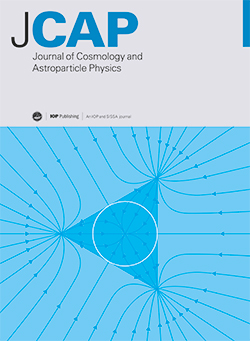Gravitational waves from inflation in LISA: reconstruction pipeline and physics interpretation
IF 5.3
2区 物理与天体物理
Q1 ASTRONOMY & ASTROPHYSICS
Journal of Cosmology and Astroparticle Physics
Pub Date : 2024-11-20
DOI:10.1088/1475-7516/2024/11/032
引用次数: 0
Abstract
Various scenarios of cosmic inflation enhance the amplitude of the stochastic gravitational wave background (SGWB) at frequencies detectable by the LISA detector. We develop tools for a template-based analysis of the SGWB and introduce a template databank to describe well-motivated signals from inflation, prototype their template-based searches, and forecast their reconstruction with LISA. Specifically, we classify seven templates based on their signal frequency shape, and we identify representative fundamental physics models leading to them. By running a template-based analysis, we forecast the accuracy with which LISA can reconstruct the template parameters of representative benchmark signals, with and without galactic and extragalactic foregrounds. We identify the parameter regions that can be probed by LISA within each template. Finally, we investigate how our signal reconstructions shed light on fundamental physics models of inflation: we discuss their impact for measurements of e.g., the couplings of inflationary axions to gauge fields; the graviton mass during inflation; the fluctuation seeds of primordial black holes; the consequences of excited states during inflation, and the presence of small-scale spectral features.LISA中来自通货膨胀的引力波:重建管道和物理学解释
宇宙膨胀的各种情况都会增强随机引力波背景(SGWB)在 LISA 探测器可探测频率上的振幅。我们开发了基于模板的 SGWB 分析工具,并引入了一个模板数据库来描述来自暴胀的动机良好的信号、基于模板的搜索原型,以及预测它们与 LISA 的重构。具体来说,我们根据信号频率形状对七个模板进行了分类,并确定了导致这些模板的代表性基本物理模型。通过运行基于模板的分析,我们预测了 LISA 在有银河系和银河系外前景和没有银河系和银河系外前景的情况下重建代表性基准信号的模板参数的准确性。我们确定了 LISA 在每个模板中可以探测到的参数区域。最后,我们研究了我们的信号重建如何揭示暴胀的基本物理模型:我们讨论了它们对测量的影响,例如暴胀轴子与规规场的耦合;暴胀期间的引力子质量;原始黑洞的波动种子;暴胀期间激发态的后果,以及小尺度光谱特征的存在。
本文章由计算机程序翻译,如有差异,请以英文原文为准。
求助全文
约1分钟内获得全文
求助全文
来源期刊

Journal of Cosmology and Astroparticle Physics
地学天文-天文与天体物理
CiteScore
10.20
自引率
23.40%
发文量
632
审稿时长
1 months
期刊介绍:
Journal of Cosmology and Astroparticle Physics (JCAP) encompasses theoretical, observational and experimental areas as well as computation and simulation. The journal covers the latest developments in the theory of all fundamental interactions and their cosmological implications (e.g. M-theory and cosmology, brane cosmology). JCAP''s coverage also includes topics such as formation, dynamics and clustering of galaxies, pre-galactic star formation, x-ray astronomy, radio astronomy, gravitational lensing, active galactic nuclei, intergalactic and interstellar matter.
 求助内容:
求助内容: 应助结果提醒方式:
应助结果提醒方式:


